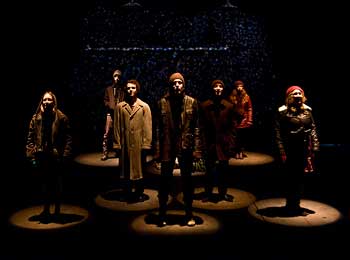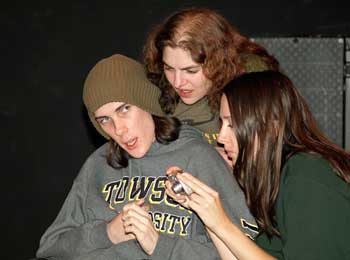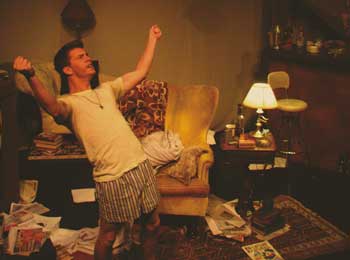The Drama of the
New Russia
By John Freedman
Russia in the first decade of the century has done little to change the world’s perception that it is a riddle wrapped in a mystery.
After a period of comparative irrelevance in the 1990s, Russia once again is a major player in international politics. Its leadership and influence is felt in virtually every key issue facing the global community. It is a nation whose leaders have learned to talk “democracy and freedom” as skillfully as any.
This all happened, meanwhile, as Russian authorities closed down independent news outlets; looked the other way when prominent “dissenting” journalists and politicians were murdered; provided tacit support to nationalist thugs; and found ways to jail or silence business leaders and social activists who dared to disagree with government policy.
Will the real Russia please stand up?
In fact, one generation of Russians – or, more precisely, a group of playwrights from that generation – has already stepped forward. These individuals were teenagers or pre-teens when Mikhail Gorbachev sought to reform the Communist Party, and entered their 20s while Boris Yeltsin led Russia through awkward battles with poverty, corruption and infrastructural collapse. They attained personal and professional maturity in their 30s as Vladimir Putin established social stability and presided over the onset of affluence and a contingent spiritual stagnation. They continue to create as Dmitry Medvedev leads Russia through the global financial crisis and struggles with hidden dilemmas left over from all the previous eras put together.
These writers, of which we selected six to participate in the New Russian Drama: Voices in a Shifting Age project, were instrumental in raising the status of Russian drama to heights unheard of for decades. Each of their compelling voices stands alone, and their visions are unique. They are not members of any club or movement, but taken together, they offer striking examples of a nation struggling – often clumsily, often cruelly, but always sincerely – to renew itself. Moreover, they represent the diversity of contemporary Russian drama not only in style, but in geography and background.
Olga Mukhina grew up in Russia’s Far North in a family of geologists but reflects Moscow’s ultra urban sensibility. Vyacheslav Durnenkov and Yury Klavdiev grew up in working neighborhoods in the tough southern city of Togliatti, occasionally known as the “Russian Detroit.” Klavdiev, incidentally, has relocated to St. Petersburg and is arguably now that cosmopolitan city’s most progressive playwright. The Presnyakov brothers, both of them university professors, hail from Yekaterinburg in the Ural Mountains region, a genuine hotbed for gritty new dramatists. Maksym Kurochkin, educated as an ethnologist and historian, was born and grew up in Kiev, Ukraine. Yaroslava Pulinovich, the youngest of the batch at 22 years old, also hails from Yekaterinburg and is a former playwriting student of the famous Nikolai Kolyada.
All have been translated into the major languages of the world and produced throughout Europe and the New World.
Russian writers are not as overtly political as some of their counterparts in the United States, but that does not mean they avoid issues of political and social significance. On the contrary, Klavdiev, Durnenkov and the Presnyakovs all deal in one way or another with the corrosion and breakdown of social norms, a painful process that inevitably leads to confusion, chaos and violence. The plays of Kurochkin and Mukhina, in vastly divergent ways, reflect the paralysis that plagues cultured people as the world changes and tosses ever new challenges at them. Pulinovich offers a uniquely personal vision of what it is like for young women, specifically, to grow up in a Russian provincial city in the early 21st century.
Anyone wanting to know where Russia stands today and where it might head in the future would be well advised to take note of what these and other Russian playwrights are saying. We live in an age when Russian newspapers and television are telling only part of their nation’s story. In the arts, poets and prose writers have slipped into the background. The film industry has been in a state of flux and crisis for over two decades.
Not surprisingly, theater and drama have emerged as the most vital and responsive media of social discourse and communication. Thanks to Mukhina, Klavdiev, Durnenkov, Kurochkin, Pulinovich and the Presnyakovs, the mystery that is Russia has become a little less enigmatic.

The Polar Truth by Yury Klavdiev. Towson University.
November 2009.
Photo: Tina Staffieri.

Richard Vinecombe, Pamela J. Gross and Caroline Reck in a reading of Olga Mukhina’s Flying at Towson University.
November 2008.
Photo: Robyn Quick.

Nick Bateman in Vodka, Fucking and Television by Maksym Kurochkin. Towson University’s New Russian Drama Season.
October 2009.
Photo: Kate Bateman.



